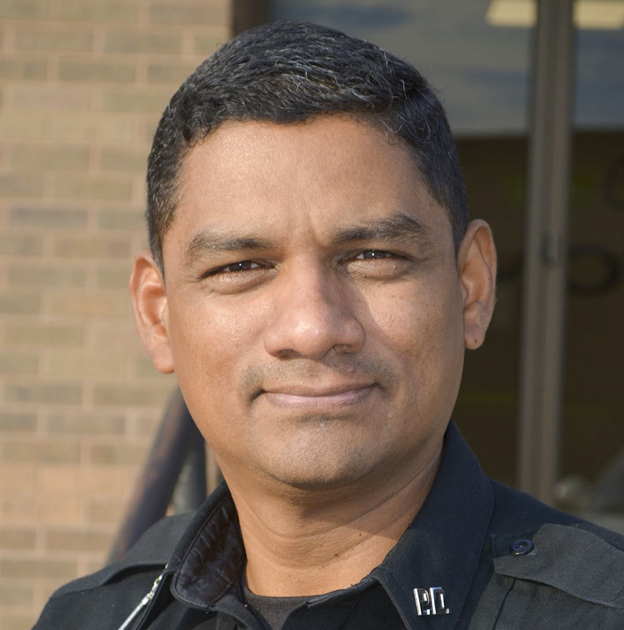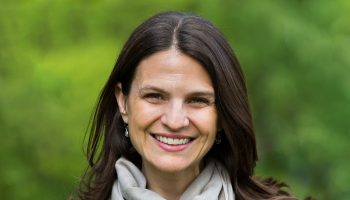MAX ZAMBRANO – STAFF WRITER

Edgar Rodriguez is perhaps one of the most important people in the city of Moville. There, a place with a population under 2,000 people on the western edge of Iowa, near the state’s tripoint border with Nebraska and South Dakota, he holds two distinctive positions: the lead pastor of New Hope Evangelical Church and the city’s police chief.
It seems natural to him.
Born in Piedras Negras, Mexico, Rodriguez moved to the next town over, Eagle Pass, Texas, when he was a toddler. After high school, he served for four years in the Marine Corps.
In 2010, Rodriguez, his wife — whom he met in the Marine Corps — and their five children moved to Moville. The goal: revitalize Moville Evangelical Church into New Hope. Three years later, he joined the county’s sheriff’s department.
Rodriguez will enter Chautauqua’s Amphitheater at 1 p.m. Tuesday, Aug. 3 to present “Empathy: The Key for Human Survival,” part of Week Six’s Interfaith Lecture Series themed “Building a Culture of Empathy.”
Both of his roles have plenty of overlap, he said.
“I do a lot of community policing and connect with as many people as possible,” Rodriguez said. “They know me as a pastor, so when they see me in my police gear, it doesn’t really change or faze them much. They talk to me just as easy as they do as a pastor.”
Getting to talk with people doubles as his ministry, he said.
“They know me as a pastor, so they’ll tell me about personal things and ask me personal questions and ask for advice and prayer,” he said. “I get to do that while I’m on duty.”
Despite Moville’s small size, it’s a hub within the county, hosting the county fair and drawing in people from neighboring towns. It’s half an hour from Sioux City, Iowa, an hour and a half from Sioux Falls, South Dakota, and three hours from Iowa’s capital and biggest city, Des Moines.
U.S. Highway 20 (a 3,365-mile coast-to-coast route) has only one four-way stop, which is in Moville. Rodriguez said it causes a couple fatal accidents each year — part of his job is monitoring the intersection (Rodriguez had to pause his interview with the Daily because a car ran the stop sign, nearly colliding with two other vehicles, he said).
Rodriguez said his ministry is serving, loving and helping people.
“It’s serving through the church, sharing the gospel of Jesus Christ with people and helping people grow in their faith,” he said. “That’s been my life.”
He said he gives plenty of advice to those as a police officer.
“I’ve led a lot of people to Christ heading down to jail in the back of my car,” he said.
Sometimes, he does have to be forceful with people who have had difficult pasts.
“A lot of times, you deal with people and they don’t know anything other than the hard life they’ve led,” he said. “A life of lie after lie after lie, just trying to get out of things. A drug life, that’s all they know. An abusive life, that’s all they know.”
Even in those situations, Rodriguez’s patience, sympathy, empathy and understanding are a short reach away.
“Once I deal with the law side of things, then I deal with the human side of things,” he said. “Sometimes, it has to be in that order. I have to be safe first, then I can give them my heart. I look forward to those moments, and I get them often.”
At the church, he also focuses a lot on community life. He said a local family had a child in an Omaha, Nebraska, hospital, two hours away, and are finally coming home. They’ve been reaching out to let the family know the community is praying for them, even if they can’t see it, he said.
Rodriguez’s empathetic heart will be at the heart of his lecture today. He said humans need connection, encouragement, understanding and recognition. Too often nowadays, he said, people react too quickly to mistakes others make.
“In this fast-paced world, people don’t give each other their time anymore,” he said.
He will use stories from his life and how God prepared him for this life and being empathetic to help others in his lecture, he said.
“I hope when people leave my talk, they can think better on how they view people, and not so quickly judge people by their actions, but take a step back and ask why,” he said. “Why did they do that? Why did this happen to them? Why are they living this way? There’s a big story behind that immediate action.”
People should exercise sympathy and empathy, or perhaps empathy followed by sympathy, before judging others, he said.
“Let’s be good human beings,” he said. “Let’s encourage one another, let’s root for one another and let’s believe in one another. I think that’s what we’re missing in our society today.”




